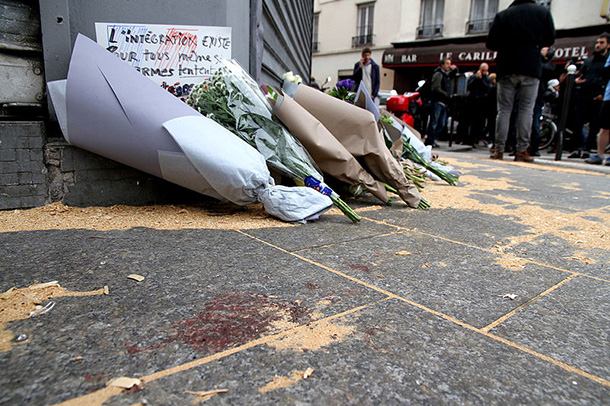The world struggles to process the carnage in Paris. More than 100 slaughtered, hundreds more injured -- physically or otherwise. Lives shattered by violence, inducing the involuntary urge by those left behind to inflict the same elsewhere, on others.
Vengeance -- the ancient emotional dipole of love -- manifests with the same passion with which we embraced those taken from us. It also lingers for generations. For if those unjustly killed are no longer here to forgive the fanatics who inflicted such violence -- or forgive us for wanting to drop the mantle of endless retribution -- who then can break the spell? Violence on violence, it cycles. This is the business case of terrorism, fanned by professional provocateurs on both sides of divide.
Beyond the human loss, there is of course cultural collateral damage. Paris is one of the world's most remarkable groves of cultural old growth -- a flower of architecture, art, cuisine and style sprouted from centuries of pollinators drawn to the global capital of mirth and creativity. There is little doubt why this particular china shop was marked for smashing.
But for the sake of argument, let's consider another china shop senselessly smashed. For eight years Iraq endured a war waged on the now-preposterous and discredited premise of making the world a safer place. Meditate on that for a moment. Studies have estimated hundreds of thousands of Iraqis and 4,500 U.S. soldiers lost their lives in the violence and chaos that followed. Each of these tragedies spawned a vengeful contagion of sorrow in loved ones left behind. Close to $2 trillion was wasted on the debacle.
It is little wonder why such a brute force intervention failed to win hearts and minds in a region renowned for retribution and long-held cultural divisions. The daily humiliations from foreign occupiers fighting a civilian counter insurgency instead fanned the flames with every door kicked in and every family traumatized. While western soldiers carried out their orders for the most part with professionalism and restraint, waging war in this volatile area was as wise as whacking a hornet's nest with a hockey stick.
The aftermath plays out to this day: the splintering of the Iraqi state, the rise of Iranian influence, the sucking power vacuum filled with ISIS and other groups almost as bad. Countless cultural treasures either plundered for profit or destroyed for political theatre because local authorities no longer existed to stop it from happening.
Across the gossamer border in Syria the contagion of violence and lawlessness spread, finding fertile ground in an area already stressed by climate change and despotic rule. An unprecedented drought between 2006 and 2011 killed over 80 per cent of Syrian livestock and drove up to three million people into extreme poverty. Displaced Syrian farmers and their families flooded into the already overcrowded cities, helping to spark the murderous civil war. Over four million refugees now pour into surrounding countries and across the borders of Europe.
The so-called war on terror launched by America and its allies in the wake of 9/11 needs to be remembered as a colossal, counter-productive failure, fueling the ping-ponging desire for retribution that almost certainly contributed to the terrible events that just occurred in Paris. One wonders whether George W. Bush pauses from his painting projects to reflect on the awful legacy of his outsized agency.
Breaking the cycle
How now to respond? Let's first recall that al-Qaida attacked the Twin Towers precisely to provoke the type of ham-handed over-reaction the Bush administration obliged with. ISIS extremists have now gone back to the same well, expanding their campaign of localized terror to Europe and perhaps beyond.
Obviously intelligence and police operations are crucial, but we need to be mindful of their inherent limitations in preventing civilian attacks. World leaders were already gathering in Paris for the world climate conference and presumably security was already on high alert. Israel boasts perhaps the most ruthlessly efficient intelligence apparatus in the world, yet still cannot guarantee the daily safety of its citizens. What little research exists on the effectiveness of counter-terrorism shows its limited utility and occasionally outcomes that are even worse than useless, in spite of billions of dollars and years of effort.
Here in Canada, our most high-profile domestic terror plot by the so-called Toronto 18 was not single-handedly undone by our national spy agency, but with the assistance of a member of the Muslim community who offered to help CSIS infiltrate the rather inept group of radicalized youth. Our society is made safer when all communities feel invested in our institutions, not marginalized by them.
Symbiotic extremists on opposing sides of the Paris tragedy will now seek to expand race-based hatred. Xenophobic parties in Europe are calling for the closure of their borders and revisiting the type of disastrous tactics that got us in this mess. Of course the perpetrators are single-mindedly focused on provoking that very outcome.
Breaking this cycle of violence will require enormous empathic discipline. The thousands of Muslim refugees flooding into Europe hate ISIS and their ilk, as only those forced to flee their homeland can. They are also powerful potential allies in uprooting those extremists obviously not entirely visible to authorities.
Most importantly, these are traumatized humans fleeing a mess not of their own making. Canada is filled with generations of such people who accumulated here for the same reason, accidently inventing a new type of society with cultural diversity previously unheard of. Such pluralistic places are living proofs that not only are multiethnic communities workable and mostly harmonious, they are also safer. ![]()
Read more: Rights + Justice, Politics















Tyee Commenting Guidelines
Comments that violate guidelines risk being deleted, and violations may result in a temporary or permanent user ban. Maintain the spirit of good conversation to stay in the discussion.
*Please note The Tyee is not a forum for spreading misinformation about COVID-19, denying its existence or minimizing its risk to public health.
Do:
Do not: